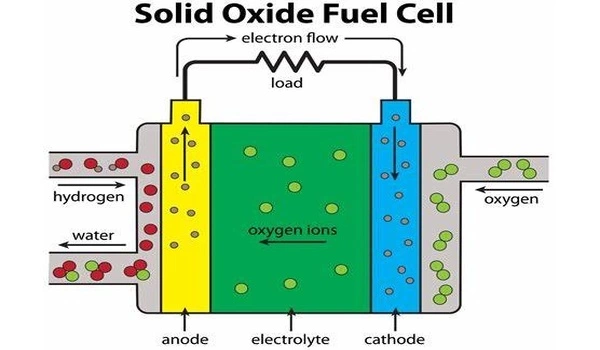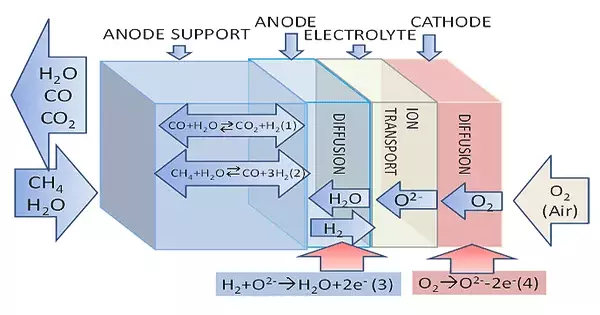The electrochemical oxidation of methylcyclohexane to produce electricity is referred to as direct power generation from methylcyclohexane using solid oxide fuel cells (SOFCs). SOFCs are devices that use an electrochemical reaction to convert the chemical energy of a fuel directly into electrical energy. They operate at high temperatures, typically between 600 and 1000 degrees Celsius, allowing them to achieve high efficiency and flexibility in fuel use.
Methylcyclohexane shows great promise as a hydrogen carrier capable of transporting and storing hydrogen in a safe and efficient manner. The dehydrogenation process using catalysts, on the other hand, has issues due to its durability and large energy loss. Japanese researchers recently succeeded in generating electricity directly from methylcyclohexane and recovering toluene for reuse using solid oxide fuel cells. This study is expected to not only reduce energy requirements, but also to investigate new chemical synthesis methods using fuel cells.
Methylcyclohexane (MCH), an organic hydride, is expected to be an excellent hydrogen carrier because it remains liquid at room temperature, is easy to transport, has low toxicity, and has a higher hydrogen density than high-pressure hydrogen. Dehydrogenation (the process of removing hydrogen atoms from molecules) in the presence of a catalyst yields hydrogen and the byproduct toluene, which can then be used to generate electricity to generate CO2-free power. However, the dehydrogenation reaction is an endothermic reaction, and energy loss as well as the facilities required for the reaction are concerns.
Fuel cells have been researched and developed as devices that generate highly efficient, carbon-free electricity via an electrochemical reaction of hydrogen and oxygen. We demonstrated that this device can be used to control dehydrogenation reactions from organic hydrides as well as oxygen substitution reactions of aromatic rings in this study.
Akihiko Fukunaga
Recently, a team of researchers from Japan, led by Professor Akihiko Fukunaga from the Department of Applied Chemistry at Waseda University, has succeeded in generating electricity directly from MCH using solid oxide fuel cells (SOFC). Their work was made available online in Volume 348 of Applied Energy.
The researchers attempted to perform two processes in a fuel cell at the same time: dehydrogenation from organic hydrides, which is an endothermic reaction, and electricity generation, which is an exothermic reaction. To accomplish this, they used an anode-supported solid oxide fuel cell with a higher operating temperature than a polymer electrolyte fuel cell. They ran it at a temperature that prevented pyrolysis of organic hydrides and under conditions that prevented carbon deposition at the electrodes.
The production ratio of toluene to benzene was 94:6. This achievement demonstrated the possibility of generating electricity without using dehydrogenation facilities, which were previously required, and using less energy than was required for dehydrogenation reactions using catalysts.

In addition, “It was elucidated that by changing the conditions, oxygen groups could be introduced into the aromatic skeleton using a fuel cell” reveals Fukunaga.
These results indicate that the MHC reacts with the conducting oxygen ions in the SOFC to successfully generate electricity. Thus, power can be generated directly from MHC, and the energy required for direct power generation is lesser than that required for the conventional catalyst-assisted dehydrogenation reaction of MCH.
“Fuel cells have been researched and developed as devices that generate highly efficient, carbon-free electricity via an electrochemical reaction of hydrogen and oxygen. We demonstrated that this device can be used to control dehydrogenation reactions from organic hydrides as well as oxygen substitution reactions of aromatic rings in this study. Fuel cells may be used in the future to create new synthetic chemistry.” Fukunaga comes to a close. Let’s hope the proposed technology pave the way for a sustainable hydrogen-based society!





